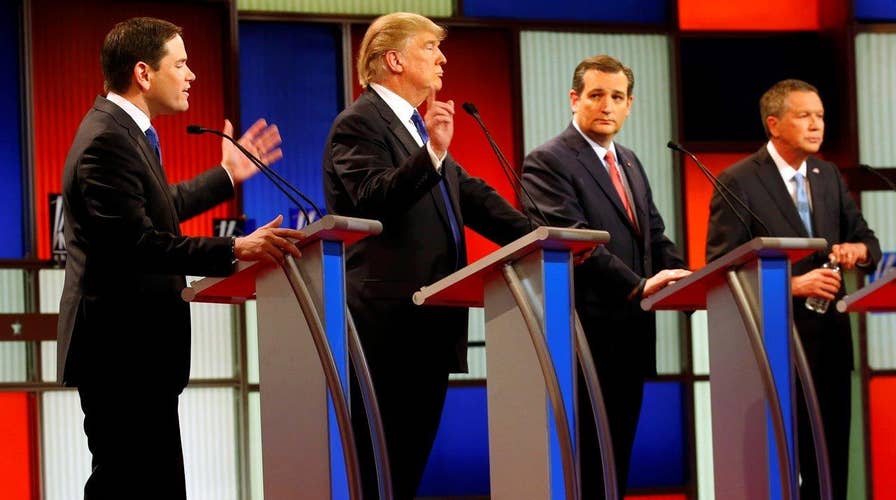Which candidate could see a boost from GOP debate?
Strategy Room: Nicole Graham and John Yob analyze Republican presidential debate
Polling and caucus sites opened Saturday morning in five states in which rivals to Hillary Clinton and Donald Trump will try to slow the Democratic and Republican front-runners' march to their respective party’s presidential nomination.
Republicans are caucusing in Kansas, Kentucky and Maine, while Democrats are caucusing in Kansas and Nebraska. Republicans and Democrats also are voting Saturday in the Louisiana primary.
Maine Democrats caucus on Sunday, while voters in both parties go to the polls in the Puerto Rico primary.
Texas GOP Sen. Ted Cruz is hoping to do well in Kansas, Kentucky and Maine caucuses, and the Louisiana primary. A good showing would help him secure his position as the No. 2 GOP candidate ahead of Florida Sen. Marco Rubio. But neither appears to have a path toward winning enough delegates or the nomination.
"Being a conservative cannot just be about how loud you're willing to scream ... or about how many names you call people," Rubio said Saturday at CPAC, the annual gathering of conservatives, just outside of Washington.
Vermont Sen. Bernie Sanders, Clinton’s only primary competitor, is favored to win the Kansas and Nebraska caucuses.
Clinton’s campaign manager braced supporters for the potential setback in a memo Wednesday that suggested the former secretary of state may lose the caucus states this weekend.
“Sen. Sanders has clear advantages and is investing heavily in two upcoming caucuses (Kansas and Nebraska),” Robby Mook wrote in a memo.
In total, 109 Democratic delegates are up for grabs, while Republicans are competing for 155.
Clinton leads Sanders 1,066 to 432 in the delegate race. Either needs 4,763 to win the party nomination.
On the Republican side, Trump leads with 329 delegates, followed by 231 for Cruz, 110 for Rubio and 25 for Kasich. The GOP canidate needs 2,472 to win the nomination, with increasing talk, particularly within the GOP establishment, about having a so-called “broker convention” to stop Trump’s insurgent candidacy.
Trump has won in New Hampshire, South Carolina, Nevada, Alabama, Arkansas, Georgia, Massachusetts, Tennessee, Vermont and Virginia.
Cruz has won in Iowa, Alaska, Oklahoma, Texas and now Kansas. Rubio won Minnesota on Super Tuesday earlier this week.
Republican candidate Ben Carson, meanwhile, suspended his campaign on Friday.
"We are going to make America great again," Trump said at a rally Saturday afternoon in Wichita, Kansas, sticking with his signature campaign slogan.
He also tried to appeal to heart land voters with his so-far wining message of building a wall along the U.S.-Mexico border, restoring America's military might and repealing and replacing ObamaCare.
"You premiums are going up like a rocket ship," Trump said to cheers from the packed rally."
Trump late went to north Orlando, Florida, for a rally ahead of the state’s March 15 winner-take-all primary that is considered a must-win for Rubio. A win in Florida and Ohio, another take-all March 15 primary, would be a huge step toward Trump winning the nomination.
On Friday, Trump pulled out of CPAC. Trump had been scheduled to speak at the four-day gathering but said he would be campaigning instead in Kansas and Florida. Florida holds its primaries on March 15.
CPAC organizers suggested they cancelled Trump’s appearance because he wouldn't take questions, a format all invited candidates were asked to follow.
“Guess what, tomorrow is an election,” a Trump spokeswoman said Friday, giving her explanation about why the candidate won’t attend the event.
The CPAC controversy follows a raucous Fox News Republican debate Thursday night in Detroit in which Cruz, Rubio and Kasich teamed up against Trump to cast him as a political salesman willing to say anything and take any position to win the nomination.
They hammered him on alleged inconsistences on his policy details and business dealings, including the now-defunct Trump University, which is being sued for scamming students out of thousands of dollars.





